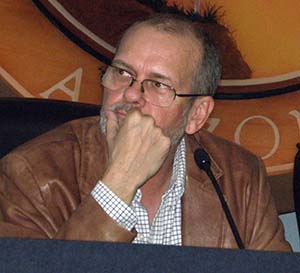
CAVE CREEK – At the beginning of Tuesday night’s council meeting, Mayor Ernie Bunch announced, “I guess it’s no secret that the Cave Creek Fiesta Days Rodeo has moved to Buckeye. We will do our best to put on a parade and other festivities.”
While this would have been the 40th anniversary of the Cave Creek Fiesta Days Rodeo, Bunch said the parade has been a town event since 1971.
After council voted unanimously to pass the consent agenda, which recommended approval for a new #12 Restaurant Liquor License for Big Earl’s Greasy Eats, Bunch congratulated Brooke Butler and stated she was the new owner of Big Earl’s.
Council unanimously approved a resolution requesting the Arizona Game and Fish Department, Tonto National Forest and the Arizona Desert Bighorn Sheep Society to join with the town in a cooperative effort to return bighorn sheep to the Spur Cross Ranch Conservation Area and other adjacent areas.
Bunch said he introduced this about 11 years ago but many of the people involved have since retired.
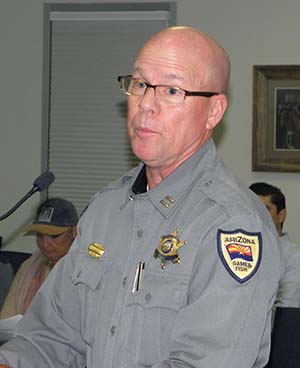
Pat Crouch from Arizona Game and Fish provided some background on the biological survey of the area but said Cave Creek was still low on the priority list and hasn’t moved up in scope.
Bunch asked which sub-species would be considered appropriate for the area.
According to Bunch, former Spur Cross Conservation Area Supervisor John Gunn, who retired in 2011, believed Rocky Mountain Bighorn Sheep would have been the proper sub-species.
However, Crouch indicated the area would appear to be more appropriate for Desert Bighorn Sheep.
Responding to Councilwoman Susan Clancy’s question about when the last known sheep were in the area, Crouch said “probably not since the ’60s – more likely the ’50s.”
Although the threat is long gone, Bunch noted there used to be a sheep shearing operation in Andora Hills near Rancho Mañana a long time ago and said domestic sheep carry diseases that can kill bighorn sheep.
Vice Mayor Ron Sova asked if there were any costs involved to the town if the sheep were introduced.
Crouch said there was no cost and they would only require the town’s cooperation.
After voting to approve the resolution, Bunch said, “John Gunn, wherever he is, would be thrilled.”
Bunch moved up agenda item number five, discussion and acceptance of the suggested resolution by the water advisory committee (WAC) regarding the moratorium on Desert Hills Water meters.
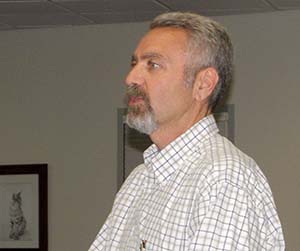
WAC Chair Tony Geiger provided council with an overview of the town’s water supply and how much is being allocated to Desert Hills.
Geiger stated the Southwest, which utilizes Colorado River water, is in year 15 of an epic drought.
He said the Colorado River is in a structural shortage with Arizona holding the “short straw” as to the priority for receiving water.
Geiger stated an official declaration of a shortage is expected in 2018, which would trigger the first round of delivery cuts.
According to an analysis performed by WAC member Kerry Smith, the town is currently using approximately 83.5 percent of its CAP allocation.
However, the town has also provided assured water supply to 299 units at .5 acre feet per unit for Cahava Springs, Hidden Rock and Windmill Apartments for an additional 149.5 acre feet.
Geiger said that brings the estimate with known commitments up to 89.3 percent of the town’s total allotment.
He pointed out there are other potential applications for water totaling an additional 30.8 acre feet, including Meritage Homes, a hotel at the Hogs ‘N Horses property, which could bring the town’s use of its allocation to 90.5 percent.
Meanwhile, Geiger added there are other actual and implicit commitments, which includes west side homeowners whose wells have gone dry, existing Desert Hills homeowners whose wells continue to drop in output, current Cave Creek property owners currently on wells (approximately 800) that may experience dropped output in the future and existing subdivisions with an assured water supply that have vacant lots ready for new homes.
Geiger said there is no way of knowing what the total demand of these implicit commitments will have on the town’s limited CAP allocation other than they will use some portion.
The WAC concluded, when combined with open commitments made to developments underway and their ongoing obligations to service their existing customers in Cave Creek, Carefree and Desert Hills, the town has committed, and possibly over-committed, all of its available CAP water allocation.
Additional concerns included the amount of water the town can supply due to the limitations on how much water it can pump up the 16-inch CAP pipeline to the water treatment plant.
Geiger stated the town cannot currently meet peak demand with the existing pipeline and pump capabilities and upgrades could run into the millions.
Because the town operates water utilities that serve three different municipal subdivisions – Cave Creek, Carefree and Maricopa County – imposing different responsibilities and liabilities, Geiger said it creates a complicated situation requiring the town to make difficult choices on how it will allocate a limited and scarce resource.
The WAC recommended council instruct the town attorney to develop an ordinance, based on existing legal precedent, to provide a foundation for guidance on how the town will move forward in making those choices of allocating water to both existing and future development for all three municipal subdivisions served by the town’s water utilities.
The committee also suggested town staff validate the figures presented and attempt to quantify its current and potential commitments.
The WAC also suggested the town develop an ordinance requiring any new development to bring its own “wet” water to the town; that the granting of water to any development, new or existing, be done by a vote of the town council; as well as a few other recommendations for acquiring additional CAP allocations in the secondary market.
Town Manager Peter Jankowski stated the Capital Improvement Plans were 90 percent complete and should be completed in February.
During public comment, Kerry Smith, who performed the analyses, upon which Geiger’s presentation was based, thanked Geiger for bringing the information forward but cautioned it was based on the best information available and may not be completely accurate.
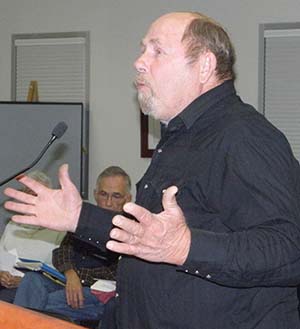
Joe Ehmann, whose eight-lot subdivision has been affected by the Desert Hills meter moratorium, said he has invested $25,000 in water lines and although he personally has water, he has several lots that are now unable to obtain water.
Greg O’Reilly stated the WAC’s recommendations were very reasonable and mentioned a number of grants and financing opportunities for which the town may be eligible.
Mark Lewis, a member of the CAP board, the Salt River Project board, and the executive director of the Water Resource Institute, a Phoenix consulting firm, said he was representing the homebuilder CB Holdings.
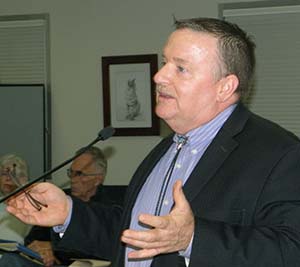
Lewis complimented the report by WAC and said the town has many assets and is privileged to have a CAP contract and the large storage tank as well as a pending application for additional CAP allocations.
However, he said the town needs a water resource management plan.
Lewis said he has a client in town who is caught up in the water meter suspension and said Scottsdale charges new customers a fee for water resource development and charges a 20 percent surcharge to customers outside its city limits.
Although Arizona is in year 16 of a 30-year drought, Lewis said the chances of the town getting its water allocation cut off is probably nil.
He said, “You’re always going to have water but what you’re going to have is higher rates.
He suggested they allow for a five to 10 percent buffer in their policy for allocating water against the town’s CAP allotment.
Sova asked if the town should be including the additional 386 acre feet it has applied for with the Department of Water Resources (DWR) and questioned what kind of certainty they had in it being approved.
Lewis said it has been his experience that it takes DWR anywhere from 12-36 months.
He encouraged council to send a letter to DWR requesting they hurry up the process.
According to Lewis, the drought isn’t really linked to water allocation and 80 percent of the state’s CAP water is used by farms, a low priority.
He said, “Municipalities would not be cut off.”
He recommended council send that letter as soon as possible and stated the town needs to find a “relief valve” for some of his clients who are caught up in the moratorium.
Bill Allen said he generally approved of what both Lewis and Geiger said.
Councilman David Smith moved to direct the town manager to expedite the recommendations and stated, “It’s obvious we need to take a number of actions to address the future.”
Clancy stated, “People who have put money into their homes need to get water.”
Bunch said the town needed to get its ducks in a row and go after the 386 acre-feet of additional CAP allocation.
The recommendations were approved unanimously.
Council voted unanimously to modify its lease agreement with Cahava Springs to address the water line north of Joy Ranch Road and rescind its prior reimbursement agreement, since the town has taken a different route to provide water to the west side at a substantially lower cost.
Councilman Thomas McGuire recused himself from discussion and voting to appoint four citizens to the WAC since his wife Elaine was an applicant.
The first round appointed Robert Morris and Kerry Smith and caused a runoff for the other two seats between Bill Allen, Rebecca Dixon and Gloria Eelkema.
David Smith made it known that Dixon was the only applicant from Desert Hills.
When the runoff resulted in another three-way tie, McGuire was summoned back in to break the tie since his wife was no longer in the running.
Council decided the person with fewer votes would be appointed to the shorter of the terms.
The third round of votes resulted in Dixon and Eelkema being appointed. However they were still tied.
Town Attorney Bill Sims said the two could toss a coin at their first WAC meeting to decide the terms of their appointment.





